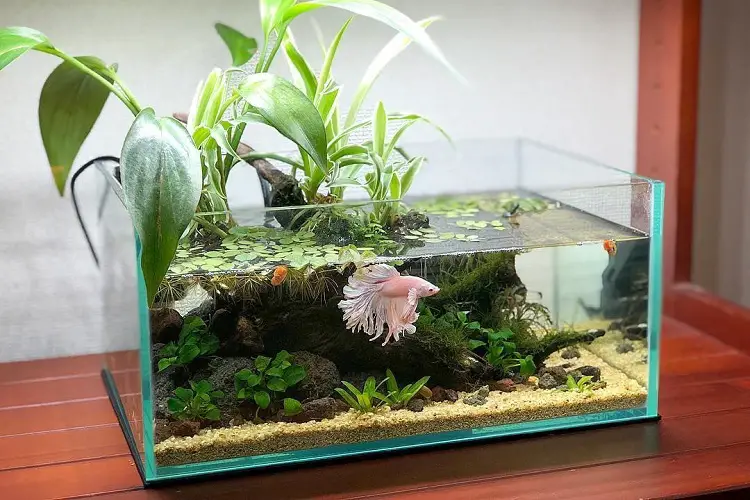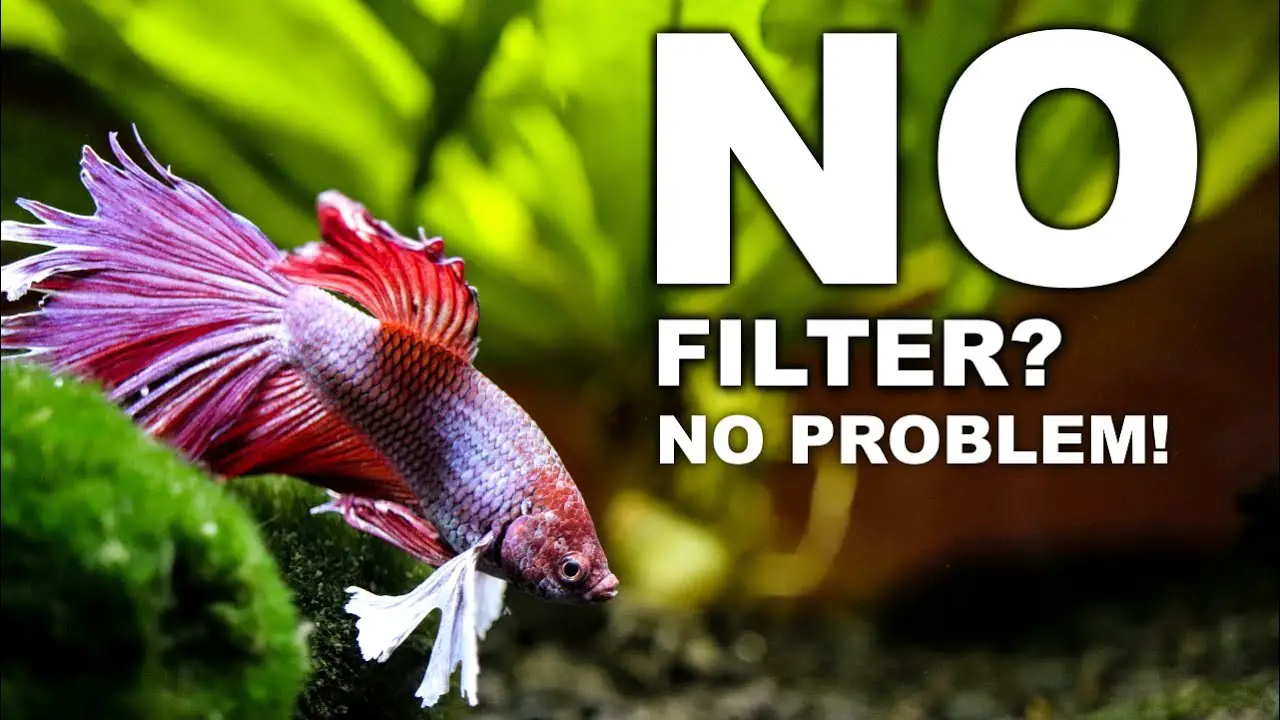Betta fish, also known as Siamese fighting fish, are popular pets for their vibrant colors and unique personalities. However, caring for a betta fish requires more than just a fishbowl and some food. One common question that betta fish owners ask is whether their pet can live without a filter. In this article, we will explore the answer to this question and provide some tips on how to keep your betta fish healthy and happy.
While it may seem like a filter is just an extra expense, it actually serves an important purpose in your betta fish’s life. Betta fish produce waste that can build up in their tank and harm their health over time. A filter helps to remove this waste and maintain the water quality in the tank. But is it possible to keep a betta fish without a filter? Let’s find out.

Can a Betta Fish Live Without a Filter?
When it comes to pet fish, betta fish are a popular choice due to their vibrant colors and interesting personalities. However, as with any pet, betta fish require proper care to thrive. One aspect of betta fish care that often causes confusion is the use of a filter. Many people wonder if a betta fish can live without a filter. Let’s explore this topic in more detail.
What is a Filter and Why is it Important?
A filter is a device that removes debris and waste from the water in a fish tank. Filters can be power filters, canister filters, sponge filters, or any number of other types. The purpose of a filter is to keep the water clean and healthy for fish to live in. Without a filter, the water in a fish tank can quickly become dirty and contaminated, leading to health problems for the fish.
While some fish species can survive in unfiltered water, betta fish are not one of them. Betta fish are tropical fish that require clean and warm water to thrive. Without a filter, the water in a betta fish tank can become polluted with harmful chemicals such as ammonia and nitrite. These substances can cause stress, disease, and even death in betta fish.
Alternatives to a Filter
If you’re unable or unwilling to use a filter in your betta fish tank, there are a few alternatives you can try. One option is to perform frequent water changes. This means changing a portion of the water in the tank on a regular basis to keep it clean and healthy. However, this can be time-consuming and may not be enough to keep the water properly balanced.
Another option is to use live plants in the tank. Live plants can help to absorb some of the waste produced by betta fish, keeping the water cleaner. However, this method also requires careful attention to water quality and may not be enough on its own.
The Benefits of Using a Filter
While it is possible for betta fish to survive without a filter, it is not recommended. Using a filter in a betta fish tank has many benefits, including:
- Keeps the water clean and healthy
- Reduces the frequency of water changes
- Helps to maintain a stable water temperature
- Provides oxygenation to the water
- Reduces the build-up of harmful chemicals in the water
Filter Vs No Filter
In summary, while it is technically possible for betta fish to live without a filter, it is not recommended. A filter is an essential part of providing proper care for betta fish. Without a filter, the water in the tank can quickly become polluted, leading to health problems for the fish. Using a filter has many benefits, including keeping the water clean and healthy, reducing the need for frequent water changes, maintaining a stable water temperature, and reducing the build-up of harmful chemicals in the water. If you’re considering getting a betta fish, be sure to invest in a quality filter to provide the best possible care for your new pet.
Frequently Asked Questions
Can a Betta Fish Live Without a Filter?
Yes, a Betta fish can live without a filter, but it is not recommended. Filters help to keep the water clean and clear of toxins, which can be harmful to your fish. Without a filter, the water can become stagnant, and harmful bacteria can grow. This can lead to health problems for your Betta fish, such as fin rot or bacterial infections.
If you choose to keep a Betta fish without a filter, you will need to change the water more frequently to keep it clean and healthy. You can also use a small air stone to provide some aeration to the water. However, it is important to note that a filter is the best way to maintain a healthy and clean environment for your Betta fish.
How Often Should I Change the Water Without a Filter?
If you decide to keep a Betta fish without a filter, you will need to change the water more frequently. It is recommended that you change the water at least once a week, but preferably twice a week. This will help to keep the water clean and clear of toxins, which can be harmful to your fish.
When changing the water, make sure to use a water conditioner to remove any chlorine or chloramine in the tap water. Also, make sure to match the temperature of the new water to the temperature of the old water, as sudden changes in temperature can be stressful for your Betta fish.
What Are Some Alternatives to a Filter for Betta Fish?
If you choose not to use a filter for your Betta fish, there are some alternatives that you can consider. One option is to use live plants in the aquarium. Plants can help to oxygenate the water and absorb toxins, which can help to keep the water clean and healthy for your fish.
Another alternative is to use a sponge filter. Sponge filters are inexpensive and easy to use. They work by trapping debris and waste in the sponge, which then provides a surface area for beneficial bacteria to grow. This can help to keep the water clean and clear of toxins.
What Should I Look for in a Filter for Betta Fish?
When choosing a filter for your Betta fish, it is important to choose one that is gentle and does not create a strong current. Betta fish prefer calm waters, and a strong current can stress them out and make it difficult for them to swim.
A filter with adjustable flow is a good option, as it allows you to customize the flow of water to meet the needs of your Betta fish. It is also important to choose a filter that is the appropriate size for your aquarium. A filter that is too small will not be effective in keeping the water clean, while a filter that is too large may create a strong current.
What Are Some Signs That My Betta Fish is Unhappy Without a Filter?
If your Betta fish is living without a filter, there are some signs that may indicate that it is unhappy. One of the most common signs is a change in behavior. If your Betta fish is lethargic or not as active as usual, it may be a sign that the water quality is poor.
Other signs to look for include a loss of appetite, fin rot, or discoloration of the fins or body. If you notice any of these signs, it is important to take action to improve the water quality in the aquarium. This may include changing the water more frequently, adding live plants, or using a sponge filter.

No Filter Betta Fish Tank: EXPLAINED
In conclusion, while it is technically possible for a betta fish to live without a filter, it is not recommended. Betta fish are tropical fish that require clean, oxygen-rich water to thrive and survive. Without a filter, the water in their tank can quickly become polluted, leading to health problems and even death.
Investing in a good quality filter is one of the most important things you can do for your betta fish. Not only will it keep their water clean and healthy, but it will also provide them with the necessary oxygen to thrive. Filters come in a variety of shapes and sizes, so it’s important to choose one that is appropriate for the size of your betta’s tank.
In short, if you want your betta fish to have a long and healthy life, a filter is a must-have. Don’t skimp on this important piece of equipment – your betta will thank you for it! By keeping their water clean and oxygen-rich, you’ll be providing them with the best possible environment in which to thrive and flourish.
